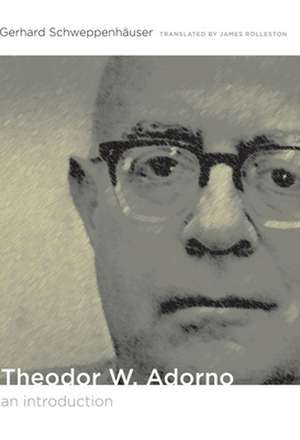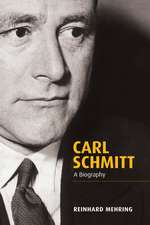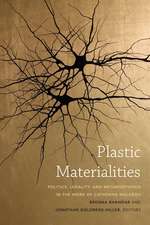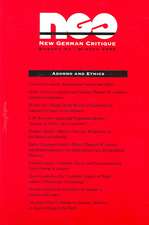Theodor W. Adorno – An Introduction: Post-Contemporary Interventions
Autor James Rolleston, Gerhard Schweppenhäuseren Limba Engleză Paperback – 5 apr 2009
Din seria Post-Contemporary Interventions
-
 Preț: 194.51 lei
Preț: 194.51 lei -
 Preț: 159.67 lei
Preț: 159.67 lei -
 Preț: 203.54 lei
Preț: 203.54 lei -
 Preț: 264.26 lei
Preț: 264.26 lei -
 Preț: 210.08 lei
Preț: 210.08 lei -
 Preț: 310.83 lei
Preț: 310.83 lei -
 Preț: 239.54 lei
Preț: 239.54 lei -
 Preț: 258.90 lei
Preț: 258.90 lei -
 Preț: 241.11 lei
Preț: 241.11 lei -
 Preț: 312.96 lei
Preț: 312.96 lei -
 Preț: 299.29 lei
Preț: 299.29 lei -
 Preț: 335.51 lei
Preț: 335.51 lei -
 Preț: 307.74 lei
Preț: 307.74 lei -
 Preț: 231.22 lei
Preț: 231.22 lei -
 Preț: 239.54 lei
Preț: 239.54 lei -
 Preț: 266.77 lei
Preț: 266.77 lei -
 Preț: 265.20 lei
Preț: 265.20 lei -
 Preț: 309.49 lei
Preț: 309.49 lei -
 Preț: 229.09 lei
Preț: 229.09 lei -
 Preț: 266.55 lei
Preț: 266.55 lei -
 Preț: 300.06 lei
Preț: 300.06 lei -
 Preț: 308.72 lei
Preț: 308.72 lei -
 Preț: 305.61 lei
Preț: 305.61 lei -
 Preț: 266.77 lei
Preț: 266.77 lei -
 Preț: 238.99 lei
Preț: 238.99 lei -
 Preț: 209.85 lei
Preț: 209.85 lei -
 Preț: 262.32 lei
Preț: 262.32 lei -
 Preț: 203.18 lei
Preț: 203.18 lei -
 Preț: 262.91 lei
Preț: 262.91 lei -
 Preț: 240.35 lei
Preț: 240.35 lei -
 Preț: 203.56 lei
Preț: 203.56 lei -
 Preț: 264.82 lei
Preț: 264.82 lei -
 Preț: 210.08 lei
Preț: 210.08 lei -
 Preț: 300.06 lei
Preț: 300.06 lei -
 Preț: 306.99 lei
Preț: 306.99 lei -
 Preț: 265.97 lei
Preț: 265.97 lei -
 Preț: 211.04 lei
Preț: 211.04 lei -
 Preț: 221.33 lei
Preț: 221.33 lei -
 Preț: 266.47 lei
Preț: 266.47 lei -
 Preț: 310.08 lei
Preț: 310.08 lei -
 Preț: 303.11 lei
Preț: 303.11 lei -
 Preț: 232.87 lei
Preț: 232.87 lei -
 Preț: 268.46 lei
Preț: 268.46 lei -
 Preț: 301.97 lei
Preț: 301.97 lei -
 Preț: 267.70 lei
Preț: 267.70 lei -
 Preț: 267.15 lei
Preț: 267.15 lei -
 Preț: 203.34 lei
Preț: 203.34 lei -
 Preț: 311.22 lei
Preț: 311.22 lei -
 Preț: 201.99 lei
Preț: 201.99 lei
Preț: 195.41 lei
Nou
Puncte Express: 293
Preț estimativ în valută:
37.40€ • 40.61$ • 31.41£
37.40€ • 40.61$ • 31.41£
Carte tipărită la comandă
Livrare economică 22 aprilie-06 mai
Preluare comenzi: 021 569.72.76
Specificații
ISBN-13: 9780822344711
ISBN-10: 0822344718
Pagini: 200
Dimensiuni: 152 x 216 x 15 mm
Greutate: 0.32 kg
Editura: MD – Duke University Press
Seria Post-Contemporary Interventions
ISBN-10: 0822344718
Pagini: 200
Dimensiuni: 152 x 216 x 15 mm
Greutate: 0.32 kg
Editura: MD – Duke University Press
Seria Post-Contemporary Interventions
Recenzii
This superb introduction to Adornos complex and difficult work is full of extraordinary insights, which will benefit the old hands as well as the beginners.Fredric Jameson, Duke University
This is a clear and concise overview of Theodor W. Adornos philosophical, political, sociological, and aesthetic thought, written by a brilliant German theorist. Gerhard Schweppenhäuser covers all the central topics in Adornos writing, shows a firm grasp not only of his work but also of the secondary literature on it, and relates his thought to the more recent theoretical literature that has challenged it.George Steinmetz, University of Michigan
Theodor W. Adorno: An Introduction is a useful survey of Adornos thought. It is concise, written in plain language, and focused on the most important topics and themes of the theorists work. Gerhard Schweppenhäuser gives essential background about the intellectual and historical context of Adornos thought and writings, and he makes a convincing case for the internal coherence of a complex and at times apparently heterogeneous body of work.Uwe Steiner, Rice University
Schweppenhäusers text is never less than eminently readable and often deeply insightful and it serves to remind us how, in an age dominated by consumerism, this great thinkers ideas remain deeply relevant. Times Higher Education
"This superb introduction to Adorno's complex and difficult work is full of extraordinary insights, which will benefit the old hands as well as the beginners."--Fredric Jameson, Duke University "This is a clear and concise overview of Theodor W. Adorno's philosophical, political, sociological, and aesthetic thought, written by a brilliant German theorist. Gerhard Schweppenhauser covers all the central topics in Adorno's writing, shows a firm grasp not only of his work but also of the secondary literature on it, and relates his thought to the more recent theoretical literature that has challenged it."--George Steinmetz, University of Michigan "Theodor W. Adorno: An Introduction is a useful survey of Adorno's thought. It is concise, written in plain language, and focused on the most important topics and themes of the theorist's work. Gerhard Schweppenhauser gives essential background about the intellectual and historical context of Adorno's thought and writings, and he makes a convincing case for the internal coherence of a complex and at times apparently heterogeneous body of work."--Uwe Steiner, Rice University "Schweppenhauser's text is never less than eminently readable and often deeply insightful and it serves to remind us how, in an age dominated by consumerism, this great thinker's ideas remain deeply relevant." - Times Higher Education
This is a clear and concise overview of Theodor W. Adornos philosophical, political, sociological, and aesthetic thought, written by a brilliant German theorist. Gerhard Schweppenhäuser covers all the central topics in Adornos writing, shows a firm grasp not only of his work but also of the secondary literature on it, and relates his thought to the more recent theoretical literature that has challenged it.George Steinmetz, University of Michigan
Theodor W. Adorno: An Introduction is a useful survey of Adornos thought. It is concise, written in plain language, and focused on the most important topics and themes of the theorists work. Gerhard Schweppenhäuser gives essential background about the intellectual and historical context of Adornos thought and writings, and he makes a convincing case for the internal coherence of a complex and at times apparently heterogeneous body of work.Uwe Steiner, Rice University
Schweppenhäusers text is never less than eminently readable and often deeply insightful and it serves to remind us how, in an age dominated by consumerism, this great thinkers ideas remain deeply relevant. Times Higher Education
"This superb introduction to Adorno's complex and difficult work is full of extraordinary insights, which will benefit the old hands as well as the beginners."--Fredric Jameson, Duke University "This is a clear and concise overview of Theodor W. Adorno's philosophical, political, sociological, and aesthetic thought, written by a brilliant German theorist. Gerhard Schweppenhauser covers all the central topics in Adorno's writing, shows a firm grasp not only of his work but also of the secondary literature on it, and relates his thought to the more recent theoretical literature that has challenged it."--George Steinmetz, University of Michigan "Theodor W. Adorno: An Introduction is a useful survey of Adorno's thought. It is concise, written in plain language, and focused on the most important topics and themes of the theorist's work. Gerhard Schweppenhauser gives essential background about the intellectual and historical context of Adorno's thought and writings, and he makes a convincing case for the internal coherence of a complex and at times apparently heterogeneous body of work."--Uwe Steiner, Rice University "Schweppenhauser's text is never less than eminently readable and often deeply insightful and it serves to remind us how, in an age dominated by consumerism, this great thinker's ideas remain deeply relevant." - Times Higher Education
Notă biografică
Textul de pe ultima copertă
""Theodor W. Adorno: An Introduction" is a useful survey of Adorno's thought. It is concise, written in plain language, and focused on the most important topics and themes of the theorist's work. Gerhard Schweppenhauser gives basic background about the intellectual and historical context of Adorno's thought and writings, and he makes a convincing case for the internal coherence of a complex and at times apparently heterogeneous body of work."--Uwe Steiner, Rice University
Cuprins
Descriere
A succinct introduction to the challenging and far-reaching thought of Theodor W. Adorno (19031969), one of the twentieth centurys most important thinkers













